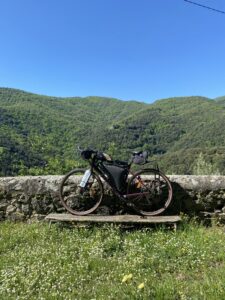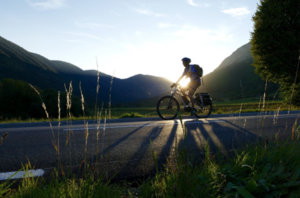 Electric bikes, also known as e-bikes, have recently taken the world by storm. Electric bikes have become an excellent option for commuting to and from work, strolling through the mountains, or just cruising around town. Some cities worldwide have even offered subsidies for purchasing them so that the option is more accessible. So if e-bikes are so great, how good are they for taking on a long-distance bike tour? Let’s look at some benefits and drawbacks of bringing an electric bike on your tour.
Electric bikes, also known as e-bikes, have recently taken the world by storm. Electric bikes have become an excellent option for commuting to and from work, strolling through the mountains, or just cruising around town. Some cities worldwide have even offered subsidies for purchasing them so that the option is more accessible. So if e-bikes are so great, how good are they for taking on a long-distance bike tour? Let’s look at some benefits and drawbacks of bringing an electric bike on your tour.
How Do Electric Bikes Work?
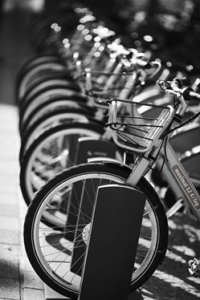 Although the term “electric bike” is used for any bicycle with a battery, not all electric bikes work the same. Electric bikes feature a drivetrain, a battery, and a motor. In general, e-bikes use this battery-powered motor to assist you in moving the pedals, which reduces the effort needed from the rider.
Although the term “electric bike” is used for any bicycle with a battery, not all electric bikes work the same. Electric bikes feature a drivetrain, a battery, and a motor. In general, e-bikes use this battery-powered motor to assist you in moving the pedals, which reduces the effort needed from the rider.
Some electric bikes can move forward under their own power thanks to the motor, but most rely on a joint effort between the motor and the rider pedaling. Electric bikes have become an environmentally friendly mode of transportation as they help riders reach longer distances and don’t generate any exhaust in the process.
Pros of Using an Electric Bike
If you’ve ridden an e-bike, then you understand all the hype. Yes, the excitement makes a lot of sense, as electric bikes come with a world of benefits. Even better, these benefits can carry over to take your bike tour experience to the next level.
You Will Conserve Energy
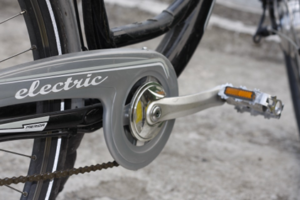 The number one benefit of using electric bikes for bike tours is their pedal assistance. By reducing the amount of force needed to pedal the bike, they help reduce the exertion required to keep moving. This ability to help you conserve energy on a bike tour is invaluable. Over the course of the tour, the energy you save will add up—this means more mileage each day and the possibility of tackling longer journeys.
The number one benefit of using electric bikes for bike tours is their pedal assistance. By reducing the amount of force needed to pedal the bike, they help reduce the exertion required to keep moving. This ability to help you conserve energy on a bike tour is invaluable. Over the course of the tour, the energy you save will add up—this means more mileage each day and the possibility of tackling longer journeys.
The Hills Will Be a Lot Easier
No matter who you are, if you are a cyclist, you probably resent hills. Therefore, e-bikes provide a refreshing sense of relief. If you struggle with knee pain or fatigue, e-bikes can mitigate some of the strain and help you up those daunting inclines.
The extra support up the hills means you won’t burn out as fast and can keep going for longer. If you are someone who never considered bike tours for these reasons, then an e-bike will make the journey much more accessible.
They Are Very Capable
On a long-distance bike tour, you might travel anywhere between 30 and 70 miles per day. The right e-bike can cruise for as much as 25 to 30 miles on a full charge. Depending on how you plan your route, you could spend the whole day using the electric assist capabilities to push you through. Even if the battery runs out, you can still pedal the bike using your own power. That said, you’ll have plenty of flexibility to work with during your tour.
You Will Reach Higher Speeds
On top of saving you effort in your pedaling, electric bikes can save you effort by simply getting you where you want to go faster! Some e-bikes can go as fast as 28 miles per hour. Talk about making a big cut into your route. Depending on the terrain and your route, you could as much as double the mileage you cover each day. Just remember to be safe—with great speed comes great responsibility.
Cons of Using an Electric Bike
Although there are plenty of great reasons to turn to an electric bike for your bike tour, there are two sides to every coin. Before you set out for the trails on a brand-new e-bike, you should consider these potential drawbacks.
Their Construction Is More Complex
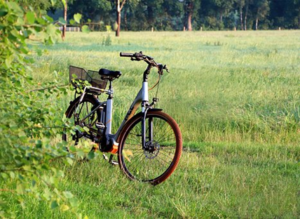 One look at an e-bike will tell you that it has a lot more going on than a traditional bike. Therefore, if something goes wrong on your tour, you might find yourself scrambling a bit more than you would with a conventional bike.
One look at an e-bike will tell you that it has a lot more going on than a traditional bike. Therefore, if something goes wrong on your tour, you might find yourself scrambling a bit more than you would with a conventional bike.
Handling maintenance can be an added challenge with an electric bike simply because more things can go wrong between the motor and the battery. Plus, if something does go wrong, the fix may be more complex than just switching out your chain or chainring. All that said, it may be harder to make a quick fix when you are out in the middle of nowhere.
Make sure to keep this in mind when preparing for your tour by having a backup plan or packing some extra tools. Of course, don’t stress yourself too much over a hypothetical, but it’s always a good idea to be prepared.
They Are Heavier Than Regular Bikes
Given their extra parts and the weight of the battery itself, electric bikes are pretty hefty compared to their traditional counterparts. An electric bike can weigh as much as 50 pounds or more, depending on the size. When the pedal assist is going strong, you will hardly notice.
However, this extra weight is a big deal if your bike runs out of battery or stops working altogether. If you hit that uphill at the wrong time, you are going to have a lot bigger challenge than that person on a traditional bike. The extra weight might also be a challenge if you need to carry the bike in and out of hostels or your host’s home each night.
You Might Have To Do Extra Planning
When you’re coasting down the road, you might not mind, but electric bikes can add an extra layer of planning to your trip. You’ll have to spend some extra mental energy figuring out when and where to charge your bike. In fact, most of your planning will have to revolve around finding a power source.
Consider that electric bikes usually take about 4-5 hours to complete a full charge from empty. However, it won’t take as long if your battery still has some juice. You can either plan to stop during a mid-day lunch or wait to stop each night to charge your bike. Either way, you’ll have to add some extra thought to your route planning. For example, if you plan on making the most of your e-bike, camping away from the electric grid each night isn’t the most realistic option.
Learn More
Ultimately, there are convincing points on both sides of whether to use an electric bike for your bike tour. If you’re willing to put in the extra planning, using an e-bike on your tour could save you time and energy while expanding your journey. Learn more about how to prepare for your next tour through the Warmshowers Forum.




